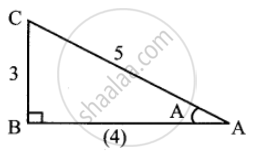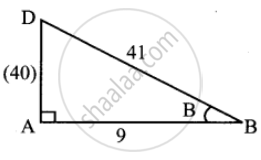Advertisements
Advertisements
प्रश्न
If sin A = `3/5` and cos B = `9/41, 0 < "A" < pi/2, 0 < "B" < pi/2`, find the value of cos(A – B)
उत्तर

sin A = `3/5`
`0 < "A" < pi/2`
From ΔABC,
AB = `sqrt(5^2 - 3^2)`
= `sqrt(25 - 9)`
= `sqrt(16)`
= 4
cos B = `9/41`
`0 < "B" < pi/2`
From ΔBAD,
AD = `sqrt(41^2 - 9^2)`
= `sqrt((41 + 9)(41 - 9))`
= `sqrt(50 xx 32)`
= `sqrt(100 xx 16)`
= `sqrt(10^2 xx 4^2)`
= 10 × 4
= 40
Now,
From ΔABC, sin A = `3/5`, cos A = `4/5`
From ΔABD, sin B = `40/41`, cos B = `9/41`
cos(A – B) = cos A cos B + sin A sin B
= `(4/5 xx 9/41) + (3/5 xx 40/10)`
= `36/205 + 120/205`
= `156/205`
APPEARS IN
संबंधित प्रश्न
`(5/7, (2sqrt(6))/7)` is a point on the terminal side of an angle θ in standard position. Determine the six trigonometric function values of angle θ
Find the value of tan `(7pi)/12`
Prove that cos(π + θ) = − cos θ
If cos(α – β) + cos(β – γ) + cos(γ – α) = `- 3/2`, then prove that cos α + cos β + cos γ = sin α + sin β + sin γ = 0
If θ is an acute angle, then find `cos (pi/4 + theta/2)`, when sin θ = `8/9`
Show that `cot(7 1^circ/2) = sqrt(2) + sqrt(3) + sqrt(4) + sqrt(6)`
Prove that (1 + sec 2θ)(1 + sec 4θ) ... (1 + sec 2nθ) = tan 2nθ
Express the following as a sum or difference
sin 35° cos 28°
Express the following as a product
cos 35° – cos 75°
Prove that `(sin 4x + sin 2x)/(cos 4x + cos 2x)` = tan 3x
Prove that 1 + cos 2x + cos 4x + cos 6x = 4 cos x cos 2x cos 3x
If A + B + C = 180°, prove that sin2A + sin2B + sin2C = 2 + 2 cos A cos B cos C
If A + B + C = 180°, prove that sin2A + sin2B − sin2C = 2 sin A sin B cos C
If A + B + C = 180°, prove that sin(B + C − A) + sin(C + A − B) + sin(A + B − C) = 4 sin A sin B sin C
If x + y + z = xyz, then prove that `(2x)/(1 - x^2) + (2y)/(1 - y^2) + (2z)/(1 - z^2) = (2x)/(1 - x^2) (2y)/(1 - y^2) (2z)/(1 - z^2)`
If ∆ABC is a right triangle and if ∠A = `pi/2` then prove that cos2 B + cos2 C = 1
Choose the correct alternative:
If `pi < 2theta < (3pi)/2`, then `sqrt(2 + sqrt(2 + 2cos4theta)` equals to
Choose the correct alternative:
Let fk(x) = `1/"k" [sin^"k" x + cos^"k" x]` where x ∈ R and k ≥ 1. Then f4(x) − f6(x) =
